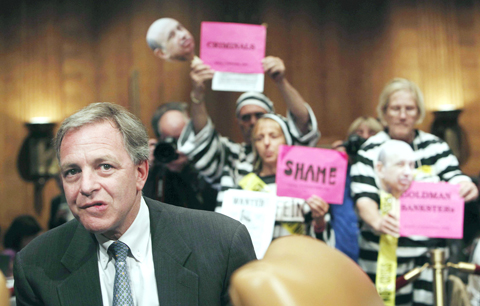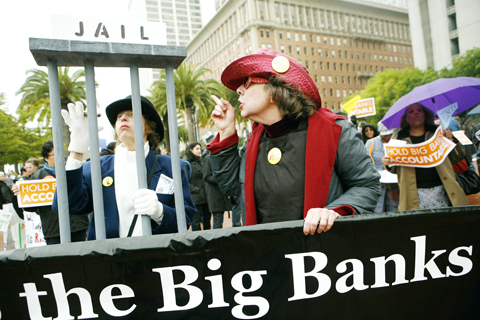The masters of the universe were forced down to earth on Tuesday.
Goldman Sachs Group Inc chief executive Lloyd Blankfein, the head of the most powerful investment bank in the world, faced a blistering cross-examination from US lawmakers about the company’s ethics and behavior toward its clients.
Blankfein conceded in the final hours of a nearly 11-hour hearing that the criticism of his firm would lead to soul searching.

PHOTO: REUTERS
He said: “Everything that’s been the subject of criticism will be tightened up,” an indication that the pressure on Wall Street may be starting to change behavior.
Blankfein, who was quoted late last year as saying he was “doing God’s work,” was asked time and time again whether it was morally correct for the bank to sell clients securities, while at the same time the firm was betting against them.
“You shouldn’t be selling junk. You shouldn’t be selling crap. You shouldn’t be betting against your own customer at the same time you’re selling to them,” Senator Carl Levin said.

PHOTO: REUTERS
“You’re going short against the very security [you’re selling] ... many of which are described as crap by your own sales force internally,” said Levin, chairman of the Senate Permanent Subcommittee on Investigations. “How do you expect to deserve the trust of your clients, and is there not an inherent conflict here?”
Blankfein was the last in a parade of Goldman Sachs current and former executives who tried to fend off accusations they helped inflate the housing bubble and then made billions off the market’s collapse.
The hearing starkly illustrated the conflict between Washington and Wall Street over blame for the financial crisis and resistance to some of the key financial reforms the Obama administration is trying to push through Congress.
Blankfein was frequently interrupted, told to answer the question and stick to the point. He often squinted as if puzzled by the questions and sometimes gave hesitant answers.
He said, as a market maker, it was not Goldman’s responsibility to tell customers how to trade or invest.
Clients “are not coming to us to represent what our views are, they probably wouldn’t care what our views are. They shouldn’t care.”
The hearing came less than two weeks after the US Securities and Exchange Commission (SEC) filed a civil fraud suit against Goldman, charging that it hid vital information from investors about a mortgage-related security.
Despite the hearing, Goldman Sachs shares were up 0.7 percent at US$153.04 by the close of trading on Tuesday, defying a drop of about 2 percent in the broader market triggered by downgrades in Greek and Portuguese debt.
Blankfein’s testimony came after the close of normal trading hours.
Goldman bond trader Fabrice Tourre, the only individual named in the SEC suit, said he did not hide material information from clients.
Senator Tom Coburn, the top Republican on the subcommittee, accused Goldman of making Tourre “a whipping boy” and questioned the firm’s motivation for releasing personal e-mails from 2007 between Tourre and his girlfriend.
Blankfein stammered through his response, saying: “There were elements here that spoke badly to the firm and we just wanted to come abreast of all the issues about which were bad to the firm.”
The current and former employees said Goldman was managing risk on individual positions rather than making a broad bet against the future of the housing market.
The Goldman executives spoke deliberately, but at times looked uncomfortable as they were asked to leaf through massive evidence binders, crammed with e-mails and other internal Goldman communications.
The executives insisted they took responsibility for their actions, but mostly blamed the housing crisis on broader industry issues, rather than their own conduct.
Former mortgage chief Dan Sparks came close to an apology, saying the bank “made some poor decisions in hindsight.”
“I don’t have any regrets about doing things that I think were improper, but we were participants in an industry that got loose,” he said.
Levin told Sparks and other executives: “You should have plenty of regrets.”
Levin closed the hearing by taking a final jab at Goldman for complaining that the committee cherry-picked from the company’s internal e-mails and other documents.
“That book in front of you is a whole bowl of cherries,” Levin said pointing at Blankfein and the evidence book. “These are not cherry-picked. Those documents reflect the history of what happened here.”

MORE VISITORS: The Tourism Administration said that it is seeing positive prospects in its efforts to expand the tourism market in North America and Europe Taiwan has been ranked as the cheapest place in the world to travel to this year, based on a list recommended by NerdWallet. The San Francisco-based personal finance company said that Taiwan topped the list of 16 nations it chose for budget travelers because US tourists do not need visas and travelers can easily have a good meal for less than US$10. A bus ride in Taipei costs just under US$0.50, while subway rides start at US$0.60, the firm said, adding that public transportation in Taiwan is easy to navigate. The firm also called Taiwan a “food lover’s paradise,” citing inexpensive breakfast stalls

TRADE: A mandatory declaration of origin for manufactured goods bound for the US is to take effect on May 7 to block China from exploiting Taiwan’s trade channels All products manufactured in Taiwan and exported to the US must include a signed declaration of origin starting on May 7, the Bureau of Foreign Trade announced yesterday. US President Donald Trump on April 2 imposed a 32 percent tariff on imports from Taiwan, but one week later announced a 90-day pause on its implementation. However, a universal 10 percent tariff was immediately applied to most imports from around the world. On April 12, the Trump administration further exempted computers, smartphones and semiconductors from the new tariffs. In response, President William Lai’s (賴清德) administration has introduced a series of countermeasures to support affected

CROSS-STRAIT: The vast majority of Taiwanese support maintaining the ‘status quo,’ while concern is rising about Beijing’s influence operations More than eight out of 10 Taiwanese reject Beijing’s “one country, two systems” framework for cross-strait relations, according to a survey released by the Mainland Affairs Council (MAC) on Thursday. The MAC’s latest quarterly survey found that 84.4 percent of respondents opposed Beijing’s “one country, two systems” formula for handling cross-strait relations — a figure consistent with past polling. Over the past three years, opposition to the framework has remained high, ranging from a low of 83.6 percent in April 2023 to a peak of 89.6 percent in April last year. In the most recent poll, 82.5 percent also rejected China’s

PLUGGING HOLES: The amendments would bring the legislation in line with systems found in other countries such as Japan and the US, Legislator Chen Kuan-ting said Democratic Progressive Party (DPP) Legislator Chen Kuan-ting (陳冠廷) has proposed amending national security legislation amid a spate of espionage cases. Potential gaps in security vetting procedures for personnel with access to sensitive information prompted him to propose the amendments, which would introduce changes to Article 14 of the Classified National Security Information Protection Act (國家機密保護法), Chen said yesterday. The proposal, which aims to enhance interagency vetting procedures and reduce the risk of classified information leaks, would establish a comprehensive security clearance system in Taiwan, he said. The amendment would require character and loyalty checks for civil servants and intelligence personnel prior to